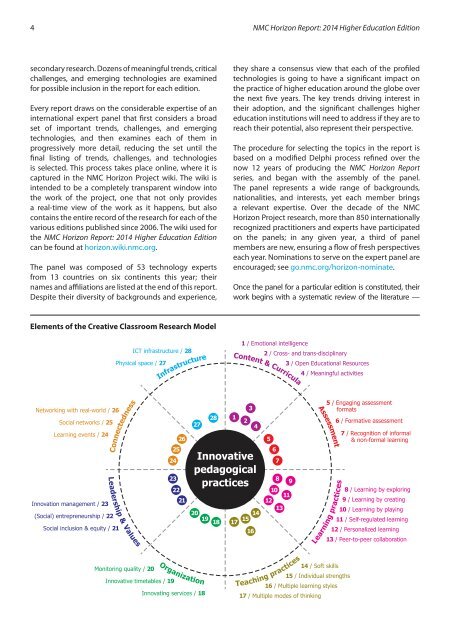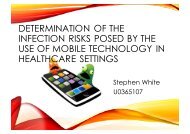NMC Horizon Report > 2014 Higher Education Edition
You also want an ePaper? Increase the reach of your titles
YUMPU automatically turns print PDFs into web optimized ePapers that Google loves.
4<br />
<strong>NMC</strong> <strong>Horizon</strong> <strong>Report</strong>: <strong>2014</strong> <strong>Higher</strong> <strong>Education</strong> <strong>Edition</strong><br />
secondary research. Dozens of meaningful trends, critical<br />
challenges, and emerging technologies are examined<br />
for possible inclusion in the report for each edition.<br />
Every report draws on the considerable expertise of an<br />
international expert panel that first considers a broad<br />
set of important trends, challenges, and emerging<br />
technologies, and then examines each of them in<br />
progressively more detail, reducing the set until the<br />
final listing of trends, challenges, and technologies<br />
is selected. This process takes place online, where it is<br />
captured in the <strong>NMC</strong> <strong>Horizon</strong> Project wiki. The wiki is<br />
intended to be a completely transparent window into<br />
the work of the project, one that not only provides<br />
a real-time view of the work as it happens, but also<br />
contains the entire record of the research for each of the<br />
various editions published since 2006. The wiki used for<br />
the <strong>NMC</strong> <strong>Horizon</strong> <strong>Report</strong>: <strong>2014</strong> <strong>Higher</strong> <strong>Education</strong> <strong>Edition</strong><br />
can be found at horizon.wiki.nmc.org.<br />
The panel was composed of 53 technology experts<br />
from 13 countries on six continents this year; their<br />
names and affiliations are listed at the end of this report.<br />
Despite their diversity of backgrounds and experience,<br />
they share a consensus view that each of the profiled<br />
technologies is going to have a significant impact on<br />
the practice of higher education around the globe over<br />
the next five years. The key trends driving interest in<br />
their adoption, and the significant challenges higher<br />
education institutions will need to address if they are to<br />
reach their potential, also represent their perspective.<br />
The procedure for selecting the topics in the report is<br />
based on a modified Delphi process refined over the<br />
now 12 years of producing the <strong>NMC</strong> <strong>Horizon</strong> <strong>Report</strong><br />
series, and began with the assembly of the panel.<br />
The panel represents a wide range of backgrounds,<br />
nationalities, and interests, yet each member brings<br />
a relevant expertise. Over the decade of the <strong>NMC</strong><br />
<strong>Horizon</strong> Project research, more than 850 internationally<br />
recognized practitioners and experts have participated<br />
on the panels; in any given year, a third of panel<br />
members are new, ensuring a flow of fresh perspectives<br />
each year. Nominations to serve on the expert panel are<br />
encouraged; see go.nmc.org/horizon-nominate.<br />
Once the panel for a particular edition is constituted, their<br />
work begins with a systematic review of the literature —<br />
Elements of the Creative Classroom Research Model<br />
ICT infrastructure / 28<br />
Physical space / 27<br />
Infrastructure<br />
1 / Emotional intelligence<br />
2 / Cross- and trans-disciplinary<br />
Content & Curricula<br />
3 / Open <strong>Education</strong>al Resources<br />
4 / Meaningful activities<br />
Networking with real-world / 26<br />
Social networks / 25<br />
Learning events / 24<br />
Innovation management / 23<br />
(Social) entrepreneurship / 22<br />
Social inclusion & equity / 21<br />
Connectedness<br />
Leadership & Values<br />
26<br />
25<br />
24<br />
23<br />
22<br />
21<br />
27<br />
1<br />
3<br />
Innovative<br />
pedagogical<br />
practices<br />
20<br />
19<br />
28<br />
18<br />
2<br />
4<br />
5<br />
6<br />
7<br />
16<br />
8<br />
9<br />
10<br />
11<br />
12<br />
13<br />
14<br />
15<br />
17<br />
Assessment<br />
5 / Engaging assessment<br />
formats<br />
Learning practices<br />
6 / Formative assessment<br />
7 / Recognition of informal<br />
& non-formal learning<br />
8 / Learning by exploring<br />
9 / Learning by creating<br />
10 / Learning by playing<br />
11 / Self-regulated learning<br />
12 / Personalized learning<br />
13 / Peer-to-peer collaboration<br />
Monitoring quality / 20<br />
Organization<br />
Innovative timetables / 19<br />
Innovating services / 18<br />
Teaching practices<br />
14 / Soft skills<br />
15 / Individual strengths<br />
16 / Multiple learning styles<br />
17 / Multiple modes of thinking



